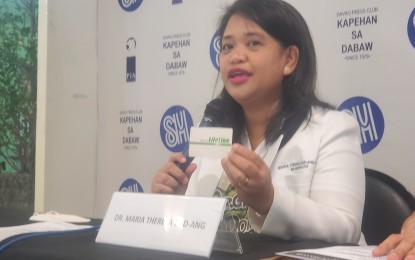
ORGAN DONATION. Dr. Ma. Theresa Bad-ang, nephrologist and head of Southern Philippines Medical Center-Human Advocate and Retrieval Effort (SPMC-SHARE), shows a sample organ donor card before the media during a press briefing in Davao City on Monday (Nov. 21, 2022). She reiterates an earlier call to the public to allow donations from their 'brain-dead' family members. (PNA photo by Che Palicte)
DAVAO CITY – A medical group here renewed its call Monday to further heighten Dabawenyos' awareness on organ donation, describing the cases of organ failures in the city as "alarming."
Dr. Ma. Theresa Bad-ang, nephrologist and head of Southern Philippines Medical Center-Human Advocate and Retrieval Effort (SPMC-SHARE) said one of the challenges confronting them is the refusal of family members to allow their patients with irreversible loss of brain function to donate some of their organs.
"We are pushing for a deceased organ donor because we are trying to stop the illegal buying and selling of kidneys. We have to strengthen deceased organ donation because if we cannot get living donors, then we have to utilize those deceased donors,” Bad-ang said in a press briefing here.
The hesitation among relatives, she said, can be addressed through a sustained public awareness campaign, along with tweaking the existing local policies on organ donation.
"The public has to know that brain-dead is dead. So when you are brain-dead, you are legally dead, and you can donate your organs as long as your family will agree to it," Bad-ang explained.
"We have so many patients that are possible donors but because their family did not agree, then we lose these donors,” she added.
According to Bad-ang, organ donation is surgically removing an organ or tissue from one person (who is brain-dead) and placing it into another person.
Before the pandemic, she said they identified around 300 possible donors who were brain-dead patients in SPMC.
However, organ donors became almost nonexistent after the pandemic was declared in March 2020.
Bad-ang advised persons who wish to donate their organs in the future to inform their families while they are still living.
"If our family does not know (about the donation), then they will not agree and other people who might be benefiting from our organs will not receive that. We have to open the minds of our countrymen about its importance," she said.
Bad-ang said that the time frame of retrieval for a brain-dead patient is so short and that the family's consent is important and urgent.
"The moment that you're declared brain-dead, we have to retrieve (the organ) as much as the shortest time possible. They will not give their consent if they don't understand," she said.
In 2020, the City Council has passed an ordinance to institutionalize organ donation in the city and promote its awareness among the Dabawenyos.
Authored by Councilor Pilar Braga, the ordinance aims to promote to the public the culture of organ donation for transplant that could save lives and correct beliefs regarding the practice.
"Davao was the only city that had a city ordinance on organ donation and on that month in November 2020, we had a successful retrieval of a donor during the pandemic," Bad-ang pointed out. (PNA)
